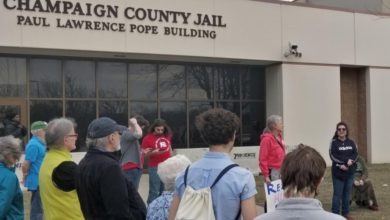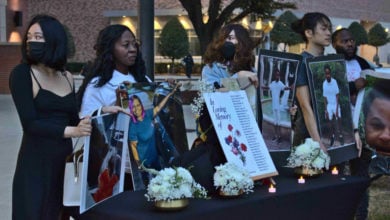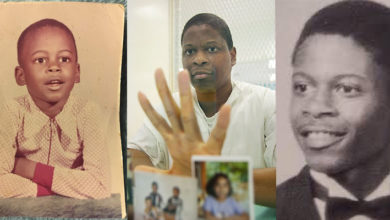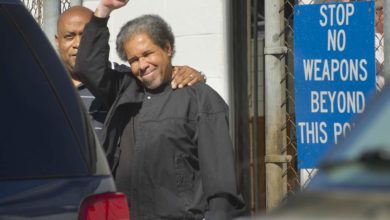Liberation
News received a letter from an individual whose son is incarcerated
at Corcoran State Prison in the Security Housing Unit. This concerned
parent also sent us a copy of the 115 write-up his son received for
participating in the hunger strikes. After some discussion, he agreed
to be interviewed if we protected the identity of his son to prevent
any further retaliation. Thus,
all names and other identifying details have been altered for the
protection of the prisoner.
Liberation
News: Tell me about your son.
Concerned
Parent: My son has been in prison
since 1998. That’s when he got arrested. He was 17-1/2 years old
and he was tried as an adult. He has been in the SHU at Corcoran
state prison for the past four years.
It’s
interesting how my son ended up in the SHU. Officers did a cell
search and they found a phone book with the name “Juan Gonzalez”
[ed note: not the real name]. There was nothing else in the phone
book, like a prison number or a date of birth, just the first name
and the last name, nothing that would associate this Juan Gonzalez
with a Juan Gonzalez they had in their database of gang members. The
prison has a database of supposedly hard-core gang members, and there
was a member of the hard-core gang with this name. Of course, this is
a very common name among Latinos and in the Mexican community, the
first name is very common and so is the last name.
The person whose
name was in the phone book was a childhood friend of my son. At that
time, he was 26 or 27 years old. During my son’s validation or
investigation process, my son wrote me a letter asking me to find his
friend Juan Gonzalez, who is just a regular person, not a gang
member.
After days of
researching for his friend, I was able to contact his parents, and
his parents were kind enough to give me his address so that I can
write to him, which I did. In my letter I told my son’s friend the
situation that my son was in and I asked him if he could write a
declaration stating who he was, date of birth and his prison number.
A couple of weeks
went by and I received a letter from my son’s friend. In his
declaration, he talks about who he is and states that he doesn’t
have anything to do with the hard-core gang and that he is just a
regular person who has been in trouble with the law and indeed was
currently incarcerated when he gave my son his phone number and his
address. Once I received the declaration from my son’s friend, I
went ahead and sent the declaration to my son, but that didn’t help
anything to get my son out of the SHU.
My son tells me
there are a lot of people in the SHU in the same situation. The
validation process that CDC has in place is very creepy, because it’s
a three-point system. In other words, a regular prisoner can get one
point if another prisoner snitches or informs an officer that you are
involved with the hard-core gangs. A second point can be acquired by
having certain literature like Malcom X or Fidel Castro. The third
point is very critical, especially for those who are currently
incarcerated: If a prisoner has a name in their telephone book that
matches the prison’s database, beware—because that’s how my son
got his ticket to the SHU.
I also would like
to point out that once a prisoner is a target of association with a
hard-core gang, he or she will not have a fair trial, because there
is no judge and the people who sentence you to the SHU for
indeterminate time are the officers.
Now, I truly
believe that the prisoner who is in the process of being validated
does not have a formal legal process to confront the other side
because, like my son tells me, you don’t know what’s going on
until you find yourself in the SHU and by then it is too late to
defend yourself. A prisoner doesn’t have an attorney or the funds
to hire one. The only way out of the SHU is by snitching on your
fellow prisoner, if you parole or if you die!
Conditions in
the SHU
My son had a
parole hearing last year to see if he was eligible to obtain a
release date, and he postponed that because he didn’t have anything
to show to the board. If you want to get out, you have to show some
type of rehabilitation or a GED to the parole board. Sad to say but
you can’t do that in the SHU.
My son has always
wanted to finish his high school education ever since he started his
prison sentence. At one point, I was willing to pay for his
correspondence courses for him, but the warden rejected that because
he said that while in the SHU prisoners are not allowed to take a
correspondence course and that was it. I have asked myself many
times, how are you going to be rehabilitated if you can’t get an
education?
While in the SHU,
the prisoner’s pastime is to watch TV or listen to the radio 23
hours a day, seven days a week. All day long, you watch TV if you
have a TV, listen to the radio if you have a radio. Now if you don’t
have a TV or a radio, you stare at the walls all day long or just
sleep your life way. So you tell me, how are you going to
rehabilitate yourself? They don’t have Alcoholics Anonymous or
Narcotics Anonymous programs that can really help this group of
individuals, who in my mind are in need of some type of
rehabilitation. My son has no contact with anyone whatsoever.
My son tells me
that when he goes to pee or defecate, he has to do it at a certain
time or else he has to smell his waste until the toilet flushes,
because there is a timer on the toilet. The CDC says it’s because
the prisoners will flush drugs or weapons, so they have to put a
timer on the toilet. There is a bright light on his cell 24 hours a
day, it never goes off. I personally would never be able to sleep if
I could not turn the light off. When he goes to sleep, he covers
himself with a thin sheet—no blanket, no pillow and zero pajamas.
He is only
allowed to wear boxers whenever he is inside of his cell, which is 23
hours a day and only allowed to wear pants when he is out of his
cell. When he goes to the yard, he goes into a little cage no bigger
than a dog kennel. They do not go every day, but rather when the
guards decide to take them. The cage is covered with a thick green
mesh tarp—in other words no sunlight comes in, no vitamin D
whatsoever.
About five years
before he was placed in the SHU, my son hit his elbow with the top
bunk and dislocated it while exercising in his cell. To make a long
story short, my son has not had appropriate care for his elbow and he
still complains to the officers. But according to him, it doesn’t
matter because they don’t care about what happens to the person
behind the closed door.
My son also tells
me that sometimes he feels like he is being locked in a trunk of a
car, and on a good day he feels like he is locked in a restroom
without any windows. That’s how he feels.
He is only
allowed to have one package per year, and when sending the annual
package it needs to weigh 23 pounds only.
He eats his meal
in his cell by himself; he tells me that the food is very distasteful
because it is cold and comes in small portions. They don’t serve
the food at a particular time; in other words, it comes when the
officers want to serve you, not when they are supposed to feed the
prisoners.
Visiting is a
nightmare!
We are only
allowed an hour visit through a telephone booth that has a big glass,
no contact visits whatsoever with our loved one. The treatment
visitors encounter is like a nightmare. I say this because of how
arrogant the officers act with family members of the prisoners.
Family members are not allowed to feed their loved ones and that
sucks!
Just to make an
appointment for a visit can take up to a whole day if you are lucky,
because these conceited officers do not answer the phone and when
they do it is like a nightmare because of how they treat you over the
phone. And if they don’t like how you answer them, sometimes they
will tell you that the week you want to visit your son is not
available. We live in San Diego, and to visit my son it takes us a
whole day literally because it’s over 600 miles round trip and over
11 hours to get to and from the prison
Liberation
News: So, your son was part of the
hunger strike?
CP:
Yes, the first hunger strike started July 1. He wrote me a letter and
told me not to worry because he would be participating and I was
definitely very worried.
The first hunger
strike lasted for 23 days and he didn’t eat for 23 days. He lost 21
pounds on the first strike.
The second hunger
strike started in October, and only lasted for 14 days. He did not
eat for 13 days; he knocked on the door and asked for some food,
because he was feeling very weak and he thought that he was going to
faint if he did not eat, or even die. It was definitely
nerve-wracking for all of our family.
The second hunger
strike was caused because nothing was mentioned about the most
important demand, which is the gang validation. This has kept many
prisoners for years and even decades in the security housing unit
without a visit, without any human contact, no phone calls to
relatives, and without any type of support. That to me is inhumane,
especially when the United States is against cruel and unusual
punishment, you be the judge. I just want people out there to know
that if you were in my son’s situation, you probably would go crazy
within a couple of months.
The one thing
prisoners want is for the CDC to change their validation policy. I
don’t think they’re asking for too much.
They are not
demanding to be released from the SHU. They are just saying it is
cruel and unusual to keep someone in the SHU for an indeterminate
sentence even if they have not had any write-ups for years and
decades.
Liberation
News: You mentioned in your letter
to us that your son has experienced retaliation for his participation
in the hunger strike.
CP:
Yes, it has come in different ways. Ever since the first hunger
strike, the CDC has retaliated in different ways. For example, the
outgoing and the incoming mail was stopped during the hunger strike,
and then the prisoners at the SHU received a memo stating that the
mail was only going to be delivered on Tuesdays and Thursdays; in
other words, the mail was only to be delivered twice a week.
Then the
prisoners at the SHU received another memo stating that money orders
they receive will be frozen for a whole month until the money order
has been cleared. I asked myself, cleared from what, it’s a money
order and it has been paid for in full. Before the hunger strike, if
you were to send a money order, the money was posted immediately on
their books. I asked myself if that’s not retaliation then what
would you call it?
Because of the
hunger strike, my son got a 115.
Liberation
News: What is a 115?
CP:
It’s a write-up. Now, because of the second hunger strike all hunger
strikers were given a write-up or a 115, and what that means is that
if you participated in the hunger strike and if you were eligible to
be paroled or had a parole date you can forget that because according
to an attorney by the name of Charles Carbone a 115 basically adds 5
years to any possibility of getting a date out of the board.
Incurring a 115 can be a serious setback in getting a date, perhaps
the biggest one according to Mr. Carbone.
I sent you a copy
of the 115 and part of it says: “You are identified as having
participated in a state wide hunger strike with gang
members/associates and disruptive groups.”
If a person who
is willing to die or starve himself or herself to death, I truly
believe that there is definitely something very wrong or else why
would 6,000 prisoners want to die, again you be the judge.
Liberation
News: What do you want to say to the
readers, what can others do to help, not your son personally but the
situation of the SHU prisoners generally?
CP:
As you can see, life for my son has been a nightmare, and for all who
love and care for him it has been a heartbreaking situation since day
one, because we feel that our hands are tied to our backs. In other
words, we can’t do anything because the prison system is so
powerful that in order to do something to help our son, brother,
uncle and father himself we would need to hire an expensive attorney
and we do not have the funds to do that.
Furthermore, I
would like to say to all your readers that it doesn’t matter if you
don’t have a friend, brother, sister, uncle, aunt, stepbrother,
stepsister, a mom or a dad incarcerated, we have an obligation to
help those who are in a desperate situation. And for those people who
have family members or even friends, never turn your back on them, if
anything try to support them by just sending a letter to them, every
once in awhile; that will make a big difference and a happy smile in
their lives .





